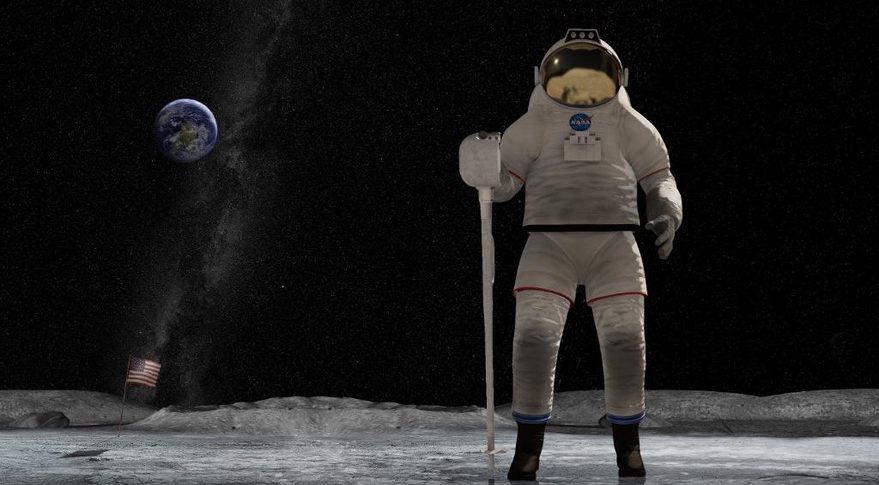The New Push to the Moon Will Be a Joint Enterprise of Nations (and Companies)

Breaking space news, the latest updates on rocket launches, skywatching events and more!
You are now subscribed
Your newsletter sign-up was successful
Want to add more newsletters?

Delivered daily
Daily Newsletter
Breaking space news, the latest updates on rocket launches, skywatching events and more!

Once a month
Watch This Space
Sign up to our monthly entertainment newsletter to keep up with all our coverage of the latest sci-fi and space movies, tv shows, games and books.

Once a week
Night Sky This Week
Discover this week's must-see night sky events, moon phases, and stunning astrophotos. Sign up for our skywatching newsletter and explore the universe with us!

Twice a month
Strange New Words
Space.com's Sci-Fi Reader's Club. Read a sci-fi short story every month and join a virtual community of fellow science fiction fans!
The next journey to the moon will be far from a solo venture. NASA will have the help of not only international government agencies but also entrepreneurs as it returns to the lunar surface, according to a news report from the International Astronautical Congress in Washington, D.C.
"Public-private partnerships are essential to what we are trying to do," Margaret Kieffer, NASA's director of the Export Control and Interagency Liaison Division, said in a panel Monday (Oct. 21), according to SpaceNews. "Entrepreneurs see the advantage and the economic benefit of putting their own skin in the game."
The panel was sponsored by Space Trust, which describes itself as a nonpartisan social enterprise working to help countries interact peacefully through space initiatives.
Related: Will Private Companies Beat NASA to the Moon?
The last time NASA landed humans on the moon between 1969 and 1972, the space world looked very different. Only two countries — the United States and the Soviet Union — had human spaceflight programs. Companies worked in space only through government contracts.
But that has changed in recent decades as other countries, such as Japan and China, and countries in the European Union, have developed space expertise. On the private-sector side, some entrepreneurs left large space companies to branch out on their own. Also, a handful of deep-pocketed businesspeople with visions of space exploration, such as Amazon's Jeff Bezos or SpaceX's Elon Musk, founded companies devoted to transporting people and goods in space cheaply and reliably.
The U.S. government sees value in forging these new relationships, not only to benefit from other companies' expertise but also to make the ecosystem of companies stronger through competition, according to SpaceNews. In turn, entities such as the Department of Commerce's Office of Space Commerce are listening closely to feedback from the private sector so that it can better streamline regulations, while ensuring that safety is held to a strict standard.
Breaking space news, the latest updates on rocket launches, skywatching events and more!
"We know that giving companies a chance to innovate and compete with one another will bring the best out of everyone," Kevin O'Connell, director of the Office of Space Commerce, said at the same panel. "It doesn't mean we give up on safety and the standards we apply."
The panelists argued that space is becoming even more accessible to countries with fewer resources. That's because more experienced countries, sometimes aided by bigger budgets, are making efforts to be inclusive of people from all around the world.
"The new space age is the platform to propel mankind from developing countries, spacefaring, new space nations alike, into space via public private partnerships and international cooperation," panel co-chair Namira Salim, founder and executive chair of Space Trust, said in a statement.
By bringing in a diversity of viewpoints from many countries, Eric Stallmer, the president of the Commercial Spaceflight Federation, said the industry becomes stronger. "It is imperative to have a global perspective of the peaceful uses of space, as well as working with partners from around the world," he said in the same statement.
- NASA's 2024 Moon Goal: Q&A with Human Landing System Chief Lisa Watson-Morgan
- Putting Astronauts on the Moon in 2024 Is a Tall Order, NASA Says
- Accelerating Moon Landing to 2024 May Make It More Achievable, NASA Chief Says
Follow Elizabeth Howell on Twitter @howellspace. Follow us on Twitter @Spacedotcom and on Facebook.

Elizabeth Howell (she/her), Ph.D., was a staff writer in the spaceflight channel between 2022 and 2024 specializing in Canadian space news. She was contributing writer for Space.com for 10 years from 2012 to 2024. Elizabeth's reporting includes multiple exclusives with the White House, leading world coverage about a lost-and-found space tomato on the International Space Station, witnessing five human spaceflight launches on two continents, flying parabolic, working inside a spacesuit, and participating in a simulated Mars mission. Her latest book, "Why Am I Taller?" (ECW Press, 2022) is co-written with astronaut Dave Williams.
